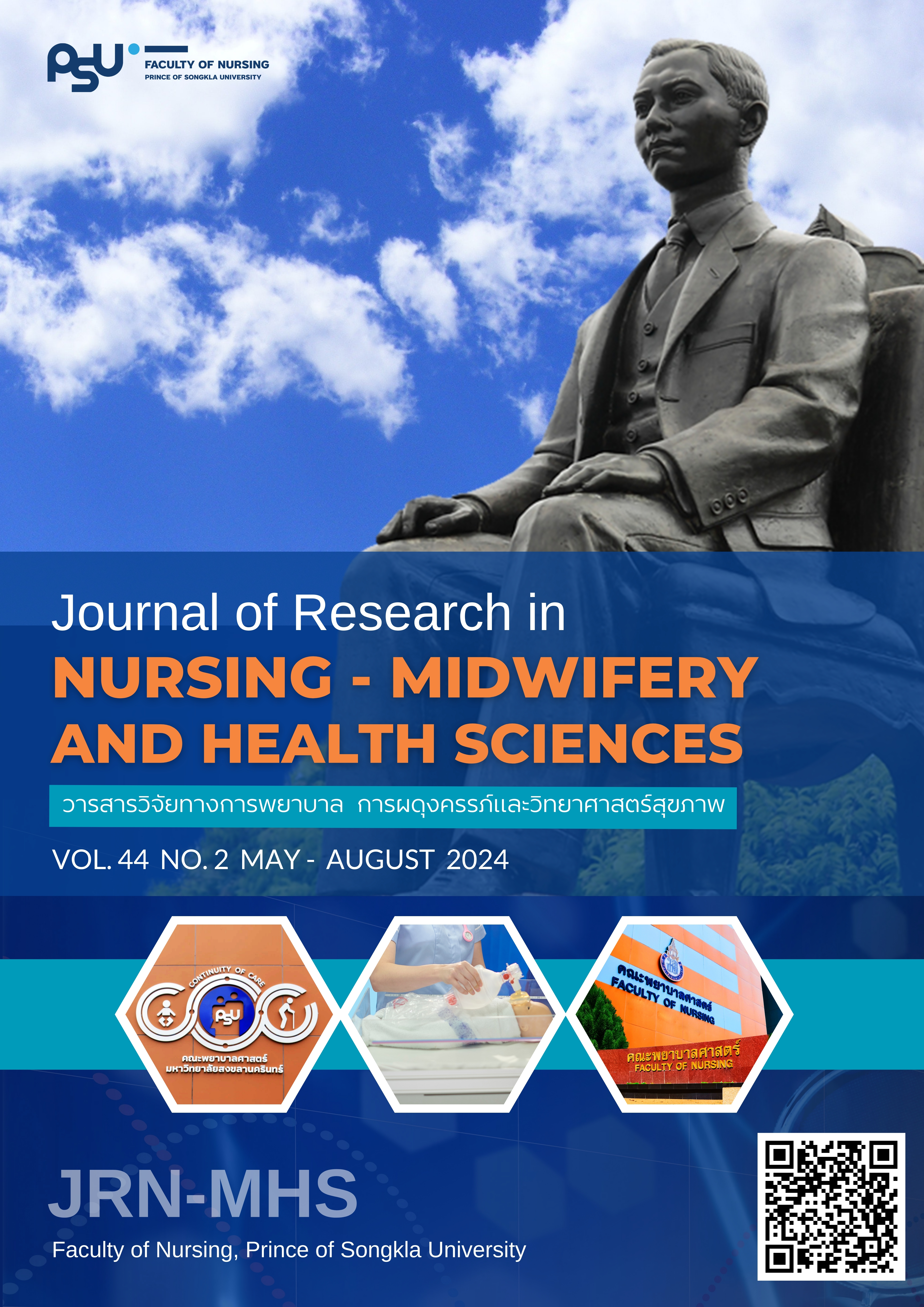ความสัมพันธ์ระหว่างระดับความเครียดและวิธีการเผชิญความเครียด ของผู้ป่วยมะเร็งลำไส้ใหญ่และทวารหนักที่เข้ารับการรักษาในโรงพยาบาล ในระหว่างการแพร่ระบาดของโรคติดเชื้อไวรัสโคโรนา 2019
Main Article Content
บทคัดย่อ
วัตถุประสงค์: เพื่อศึกษาการประเมินตัดสินสถานการณ์ ระดับความเครียดวิธีการเผชิญความเครียด และหาความสัมพันธ์ระหว่างระดับความเครียดและวิธีการเผชิญความเครียดของผู้ป่วยมะเร็งลำไส้ใหญ่และทวารหนักที่เข้ารับการรักษาในโรงพยาบาลในระหว่างการแพร่ระบาดของโรคติดเชื้อไวรัสโคโรนา 2019 โดยใช้แนวคิดความเครียดและการเผชิญความเครียดของ Lazarus & Folkman วิธีการ: คัดเลือกกลุ่มตัวอย่าง 70 ราย แบบเจาะจงตามคุณสมบัติที่กำหนด เครื่องมือวิจัยประกอบด้วย (1) ข้อมูลส่วนบุคคลและประวัติการเจ็บป่วย (2) แบบสัมภาษณ์การประเมินตัดสินสถานการณ์และระดับความเครียด และ (3) แบบวัดการเผชิญความเครียดประกอบด้วย ด้านการมุ่งแก้ปัญหา ด้านการจัดการกับอารมณ์ และด้านการบรรเทาความรู้สึก เครื่องมือส่วนที่ 2 และส่วนที่ 3 ผ่านการตรวจสอบจากผู้ทรงคุณวุฒิได้ค่าความตรงตามเนื้อหาเท่ากับ 1.0 และ .93 ตามลำดับ
และเครื่องมือส่วนที่ 3 มีค่าสัมประสิทธิ์แอลฟาของครอนบาคโดยรวมเท่ากับ .70 วิเคราะห์ข้อมูลเชิงคุณภาพด้วยการจัดกลุ่มเนื้อหา วิเคราะห์ข้อมูลเชิงปริมาณด้วยสถิติพรรณนาและหาความสัมพันธ์ด้วยสัมประสิทธิ์สหสัมพันธ์เพียร์สัน ผลการศึกษา: กลุ่มตัวอย่างประเมินตัดสินสถานการณ์เป็น 2 ลักษณะ คือ (1) เป็นอันตรายและคุกคามต่อสุขภาพ และ (2) ส่งผลต่อชีวิตทุกด้านสูญเสียและท้อแท้ โดยมีระดับความเครียดเฉลี่ย 3.81 (SD = 2.51) กลุ่มตัวอย่างใช้วิธีการเผชิญความเครียดด้านการบรรเทาความรู้สึกมากที่สุด รองลงมาเป็นด้านการมุ่งแก้ปัญหา และด้านการจัดการกับอารมณ์ ตามลำดับ ระดับความเครียดมีความสัมพันธ์ทางบวกกับวิธีการเผชิญความเครียดด้านการจัดการกับอารมณ์อย่างมีนัยสำคัญทางสถิติ (r = .502, p < .01) และมีความสัมพันธ์ทางลบกับวิธีการเผชิญความเครียดด้านการมุ่งแก้ปัญหาอย่างมีนัยสำคัญทางสถิติ (r = -.377, p < .01) สรุป: ผลการศึกษาเป็นประโยชน์สำหรับพยาบาลในการพัฒนาแนวทางสนับสนุนวิธีการเผชิญความเครียดที่เหมาะสมของผู้ป่วยมะเร็งลำไส้และทวารหนักต่อไป
Article Details

อนุญาตภายใต้เงื่อนไข Creative Commons Attribution-NonCommercial-NoDerivatives 4.0 International License.
เอกสารอ้างอิง
Sung H, Ferlay J, Siegel RL, et al. Global cancer statistics 2020: GLOBOCAN estimates of incidence and mortality worldwide for 36 cancers in 185 countries. CA: A Cancer J. Clin. 2021; 71(3): 209-49. doi: 10.3322/caac.21660.
National Cancer Institute, Department of Medical Services, Ministry of Public Health, Thailand. Hospital-based cancer registry 2022. Bangkok: Medical Digital Unit, National Cancer Institute; (2024). Thai.
Surattani Cancer Hospital. Hospital based cancer register. Surattani: Surattani Cancer Hospital; 2024 [cited 2024 May 3]. Available from: https://lookerstudio.google.com/reporting/3800e463-262c-45a2-a2c7-0034fab0920c/page/ho6vC.
Hossain S, Karuniawati H, Jairoun AA, et al. Colorectal cancer: A review of carcinogenesis, global epidemiology, current challenges, risk factors, preventive and treatment strategies. Cancers. 2022; 14: 1732. doi: 10.3390/cancers14071732.
Brind’Amour A, Dubé P, Tremblay JF, et al. Canadian guidelines on the management of colorectal peritoneal metastases. Curr Oncol. 2020; 27(6): e621-e31. doi: 10.3747/co.27.6919.
Darunihorn P, Seabmuangsai O. Comparison of locally advanced rectal cancer with pre-operative concurrent chemoradiation and postoperative concurrent chemoradiation in Roi Et Hospital. Mahasarakham Hospital Journal. 2022; 19(2): 100-12. Thai.
Altun I, Sonkaya A. The most common side effects experienced by patients were receiving first cycle of chemotherapy. Iran J Public Health. 2018; 47(8): 1218-19.
Rohan EA, Townsend JS, Fairley TL, et al. Health behaviors and quality of life among colorectal cancer survivors. J Natl Compr Canc Netw. 2015; 13(3): 297-302. doi: 10.6004/jnccn.2015.0041.
Ha SH, Shim IH, Bae DS. Differences in depressive and anxiety symptoms between cancer and noncancer patients with psychological distress. Indian J Psychiatry. 2019; 61(4): 395-99. doi: 10.4103/psychiatry.IndianJPsychiatry_342_18
Abelson JS, Chait A, Shen MJ, et al. Sources of distress among patients undergoing surgery for colorectal cancer: A qualitative study. J Surg Res. 2018; 226: 140-149. doi: 10.1016/j.jss.2018.01.017.
Yi JC, Syrjala KL. Anxiety and depression in cancer survivors. Med Clin North Am. 2017; 101(6): 1099-1113. doi: 10.1016/j.mcna.2017.06.005.
Guan Y, Yao W, Yu H, et al. Chronic stress promotes colorectal cancer progression by enhancing glycolysis through B2-AR/CREB1 signal pathway. Int J Biol Sci. 2023; 19(7): 2006-19. doi: 10.7150/ijbs.79583.
Department of Mental Health. Mental health crisis assessment and treatment team. Nonthaburi: Department of Mental Health; 2020. Thai.
Liu C, Zhao Y, Okwan-Duodu D, et al. COVID-19 in cancer patients: Risk, clinical features, and management. Cancer Biol Med. 2020; 17(3): 519-27. doi: 10.20892/j.issn.2095-3941.2020.0289.
Miaskowski C, Paul SM, Snowberg K, et al. Stress and symptom burden in oncology patients during the COVID-19 pandemic. J Pain Symptom Manage. 2020; 60(5): e25-34. doi: 10.1016/j.jpainsymman.2020.08.037.
Wang Y, Duan Z, Ma Z, et al. Epidemiology of mental health problems among patients with cancer during COVID-19 pandemic. Transl Psychiatry. 2020; 10(1): 263. doi: 10.1038/s41398-020-00950-y.
Lazarus RS, Folkman S. Stress, appraisal, and coping. New York: Springer; 1984.
Asiedua GB, Eustace RW, Eton DT, et al. Coping with colorectal cancer: A qualitative exploration with patients and their family. Fam Pract. 2014; 31(5): 598-606. doi: 10.1093/fampra/cmu040.
Opasrattanakorn S, Detprapon M, Sumdaengsrit B. Stress and coping of nasopharyngeal carcinoma patients receiving concurrent chemoradiotherapy treatment. Rama Nurs J. 2015; 21(2): 158-71. Thai.
Pothiban L, Khampolsiri T, Sasiwongsakul N. Stress and stress-coping behaviour in caregivers of older adults having Parkinson’s disease. JTNMC. 2019; 34(2): 62-75. Thai.
Polit FD, Beck TC. Nursing research: Generating and assessing evidence for nursing practice. Eleventh edition. Philadelphia: Wolters Kluwer Health; 2021.
Sangchan H. Stress and coping of women diagnostic beast lump during waiting for biopsy [master’s thesis]. Bangkok: Mahidol University; 1998. 113 p. Thai.
Calderon C, Jimenez-Fonseca P, Jara C, et al. Comparison of coping, psychological distress, and level of functioning in patients with gastric and colorectal cancer before adjuvant chemotherapy. J Pain Symptom Manage. 2018; 56(3): 399-405. doi: 10.1016/j.jpainsymman.2018.05.010.
Vargas-Román K, Tovar-Gálvez MI, Liñán-González A, et al. Coping strategies in elderly colorectal cancer patients. Cancers. 2022; 14: 608. doi: 10.3390/cancers14030608.
Sharour LA, Omari OA, Malak MZ, et al. Using mixed-methods research to study coping strategies among colorectal cancer patients. Asia-Pac J Oncol Nurs. 2020; 7(1): 81-7. doi: 10.4103/apjon.apjon_20_19.


